“Looking back, I feel really proud of myself, as I would never normally say yes to presenting in front of large groups. I really enjoyed the whole process.” – Sagal Qodah, 2017 scholarship winner
Each year Millennium Point pay for the tuition fees of one young person to pursue a STEM related degree at Birmingham City University (BCU). This is part of the ongoing work of the Millennium Point Charitable Trust to support the growth of science, technology, engineering and maths (STEM) and education in greater Birmingham and the West Midlands.
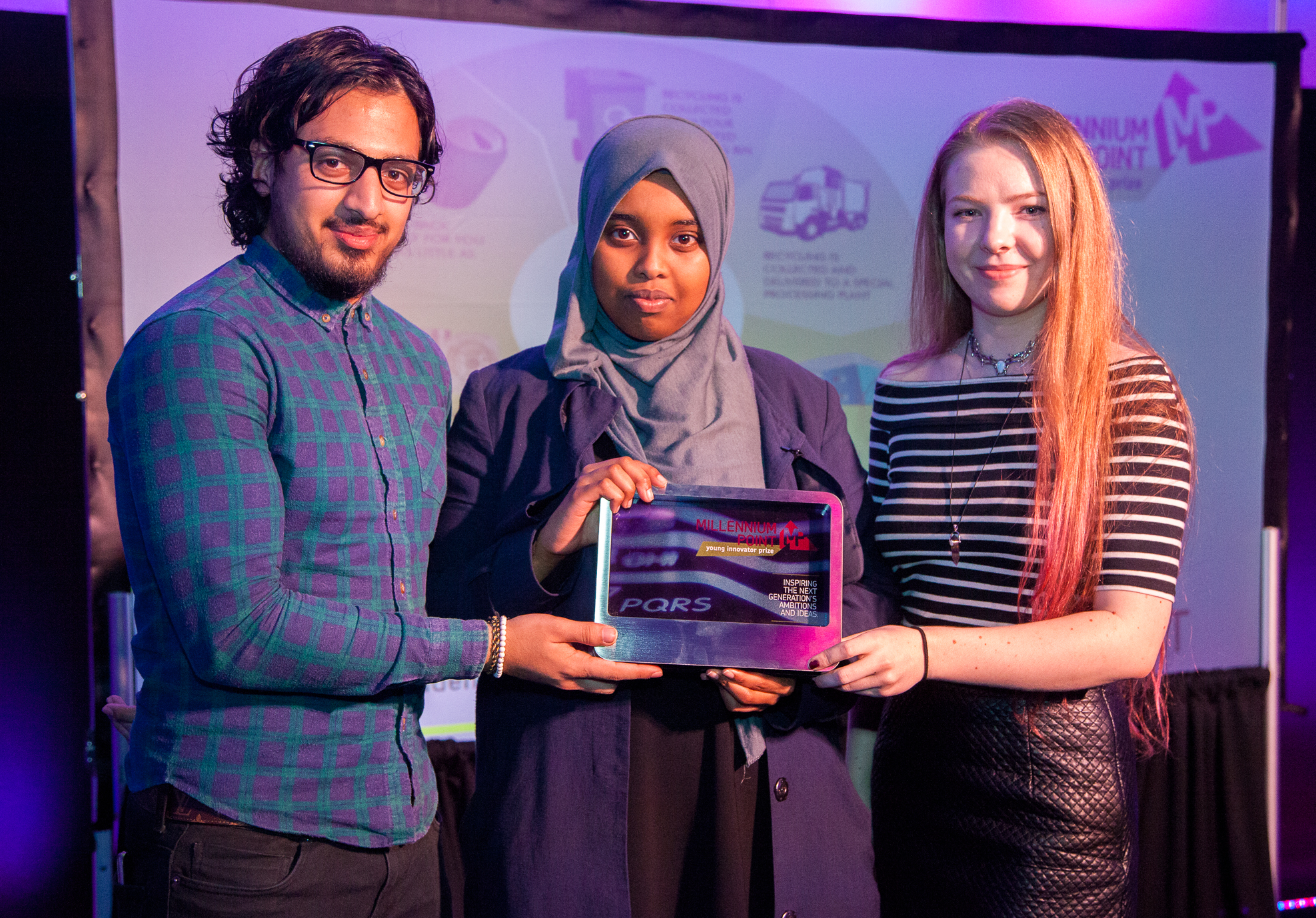
MEET SAGAL
Sagal won the Millennium Point Scholarship (then called “The Young Innovator Prize”) in 2017, which funded her Civil Engineering course at BCU, and is currently working for Jacobs as a Graduate Geotechnical Engineer, having graduated in 2020 with a First Class Honours degree.
Sagal applied after hearing about the opportunity through her school; in fact, Sagal is the second pupil from Ark St Alban’s Academy in Highgate, Birmingham, to have received the scholarship, as a former pupil also received the funding from Millennium Point two years previously.
On why she chose BCU, Sagal says: “I liked the fact the university buildings were modern and had great laboratories to carry out experiments, compared to other universities. There were a variety of opportunities for me to develop, and, as a civil engineer, it was an exciting prospect to see the development of the city, along with the enabling works of HS2 over the three years of my course.”
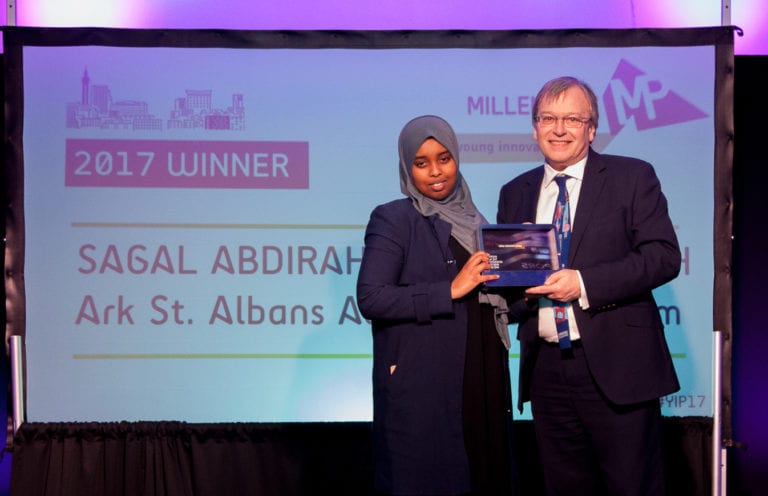
SAGAL’S STORY
When asked why Sagal decided to apply, she says: “I did think about going abroad to study in Denmark at one point, but when I heard about the chance to have my tuition fees paid for and completely taken care of, it did make me rethink, and the financial assistance provided by the scholarship is the main reason I applied.
“The application process itself was easy and simple, and I was fortunate enough to have help from my careers advisor too, which made everything even smoother.”
While the 2021 final is a virtual one, Sagal reflects on her experience in 2017, when it was a live final in front of a panel of judges and audience of over 200 people: “It was nerve-wracking as I had never presented to or spoken in front of that many people before, and I did find it challenging beforehand when deciding what to include and how to structure my presentation, as well as preparing for any questions that I may have to answer. However, I had the encouragement and support from my friends and teachers which made the process and the evening itself less stressful.
“Looking back, I feel really proud of myself, as I would never normally say yes to presenting in front of large groups. I really enjoyed the whole process.”
Thinking about how the Millennium Point scholarship has benefited her, Sagal explains: “It has allowed me to step outside of my comfort zone and in turn, it has meant that my confidence has increased – something which was incredibly valuable to me as I was starting university not knowing anyone. Through the scholarship and support from Millennium Point, I’ve been able to increase my network, have been given access to industry events, and I’ve also been provided with help and guidance when needed.
“For anyone thinking about applying for the scholarship, I would advise making the most of the process and don’t doubt yourself, as anything is possible if you put your mind to it.”
UNLOCK THEIR FUTURE
Millennium Point is helping young people across the region unlock their future. For more information on how to apply or get involved please, visit www.millenniumpoint.org.uk/scholarship
Find more interesting content from Millennium Point over at our news section, or follow us for daily updates on Facebook, Twitter, Instagram and LinkedIn with @MillenniumPoint. Millennium Point is a landmark public building and multi-award-winning events venue in the Eastside of Birmingham City centre. Profits from our commercial activity are invested by the Millennium Point Charitable Trust into projects, events and initiatives which support the growth of science, technology, engineering and maths (STEM) and education in the West Midlands.
Over the past few decades, Corporate Social Responsibility (CSR) has become an important part of many businesses worldwide. Like many things, the coronavirus pandemic caused businesses to take a step back and question their purpose, value and impact. This in turn has increased the development of CSR initiatives, with more and more businesses feeling the pressure from employees and consumers to operate with a stronger social conscience. This blog will look at what CSR is and four reasons why you should care.

WHAT’S CSR?
In general terms, CSR is the responsibility of an organisation for the impacts of its decisions on society and the environment above and beyond its legal obligations, through transparent and ethical behaviour. Previously, CSR was more common among the biggest brands as a way of addressing the impact their practices had on the environment but over recent decades, it has become more commonplace due to factors such as shifting public interests in environmental and ethical issues and legal changes which have made some aspects of CSR compulsory.
A prominent local example of CSR in action is with Cadbury’s. George and Richard Cadbury created the model village of Bourneville for their workers in Southwest Birmingham. This was born out of their desire to create better working conditions and quality of life for their workers compared to squalid conditions that were common at the time. Today, Cadbury’s CSR has evolved into the Cadbury Foundation which delivers regular projects and donations to local communities.
WHY YOU SHOULD CARE
Other than it being a nice way of giving back there are several reasons why CSR is important and if you don’t already think about it then you should.

CSR ATTRACTS TALENT
Having a strong CSR is a gateway to attracting fresh talent, passionate about working for you. With Millennials making up around half of the workforce and Generation Z taking their first strides, CSR has never been more of a hook for attracting fresh talent. One report suggests that 82% of millennials consider CSR efforts of an organisation when deciding where to work. It goes on to suggest that 70% are actually willing to take a pay cut to work for a company with strong social values. This trend is likely only to increase as more of Gen Z and beyond enter the workforce.

CSR CAN REDUCE EMPLOYEE TURNOVER
On the same notion, companies who actively engage their people in CSR projects reduce their employee turnover by about half. This helps employees feel that their work has purpose beyond their role, serves as a source of motivation and raises morale. In turn, this equates to more job satisfaction which is a major factor in retaining your workforce.

CSR CAN INCREASE REVENUE
Companies who invest in a social purpose have 4-6% higher market value and 20% more revenue compared to those who don’t according to a study in 2015 reported by The Telegraph. As collective social consciousness soars, so does a cultural shift occur and the demand from consumers for more ethical practises and CSR from businesses. CSR raises your profile and makes your company more attractive to consumers and investors. We only need to look at the rise in ethically driven SMEs over the past few years to see this in effect. It also shows that consumers are willing to pay a bit extra when they know the products and business are ethically driven.
Similarly, in a B2B space, business’ and investors are more likely to choose businesses with strong CSR profiles for the simple fact that it increases their own. Many of our clients here at Millennium Point cite our strong commitment to investing our profits into STEM education projects and initiatives – more of which you can read about here.

CSR IS A GREAT BRAND TOOL
In the same article, The Telegraph reported that a quarter (25%) of a company’s market value is it’s reputation. Brand is an important part of any business and CSR is an excellent way of elevating it. CSR gives another layer of engagement with your customers, which means more touch points for you to grab their attention and get their buy-in. In fact, 76% of the general population believe business leaders should take a lead on social and environmental issues — that’s 76% of the population who you could be engaging with right now with your CSR projects.
Engagement aside, it raises the overall perception of your brand. Businesses who show that they are taking an active role in tackling environmental and social issues are seen as more respectable and more human. This legitimises your brand and leads to more recognition and brand loyalty.
MILLENNIUM POINT’S CSR
Profits from our commercial activity as a multi-award-winning venue and landmark public building are invested by the Millennium Point Charitable Trust. This investment approximates to around £5m annually on projects, events and initiatives which promote the growth of science, technology, engineering and maths (STEM) and education in Birmingham and the wider West Midlands. That means a percentage of any event booking or ticket purchase you make goes towards improving education locally. Read more about some of the projects we have funded here.
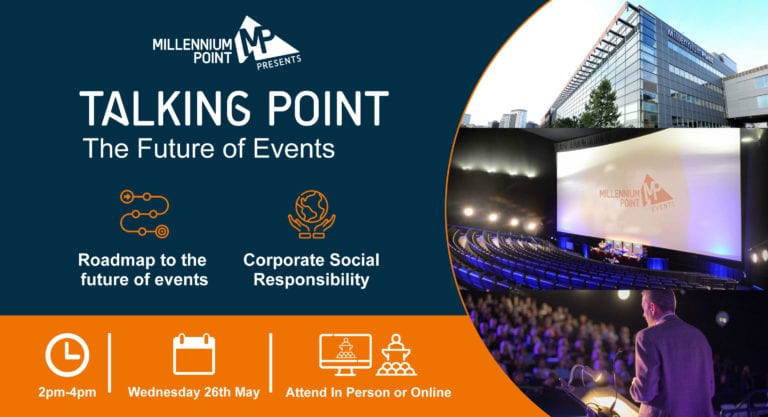
JOIN THE DISCUSSION ON CSR
Get your free ticket to our own hybrid conference Talking Point: The Future of Events from 2pm – 4pm on Wednesday 26th May. This two-hour event consists of two panels that will examine the impact of the pandemic and what the next 12-18 months has in store for the events industry – topics include CSR, sustainability and current trends. You can join online or in-person to see how a hybrid event at Millennium Point works as well as join in a vital conversation around kickstarting the events and hospitality industry across the UK.
To reserve your ticket, or for further information, visit the dedicated page here.
Find more interesting content from Millennium Point over at our news section, or follow us for daily updates on Facebook, Twitter, Instagram and LinkedIn with @MillenniumPoint. Millennium Point is a landmark public building and multi-award-winning events venue in the Eastside of Birmingham City centre. Profits from our commercial activity are invested by the Millennium Point Charitable Trust into projects, events and initiatives which support the growth of science, technology, engineering and maths (STEM) and education in the West Midlands.
Every year, the Millennium Point Charitable Trust Small Grants programme gives out grants of up to £20,000 to support science, technology, engineering and maths (STEM) education projects in the West Midlands. Applications are now open for 2021.
Here is one of the many projects that the programme has funded in 2020.
Who’s running the project?
South Bromsgrove High School is a co-educational, secondary school and sixth form with academy status, located in Bromsgrove, Worcestershire.

What’s it all about?
The initiative funded by the grant forms part of a much wider international project, based in The Netherlands, called HiSPARC.
It is a network of cosmic ray detectors situated in schools and universities that feed their data into a public database, allowing students to analyse it and carry out original research. They can start with a simple task, which might be looking at the variation between night and day or winter and summer, then progress to more complex investigations including identifying sources of the cosmic rays somewhere out there in space.
Atmospheric conditions are a factor in the number of cosmic rays hitting the detectors, so the automatic weather station which the grant will fund will extend the scope of the school’s investigations as well as those of other students in Britain and The Netherlands that use HiSPARC. In addition, each project completed can be submitted for a CREST Award at Bronze, Silver or Gold, depending on the level of challenge as certification for their contribution to scientific research.
The remainder of the grant will ensure that more staff at South Bromsgrove High School can also be trained to lead groups of students to help build capacity and expertise on this project.
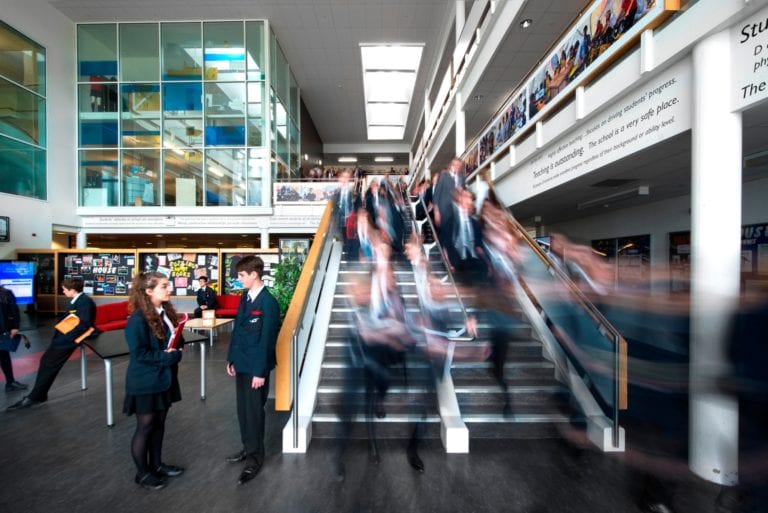
Who will benefit?
At least a dozen students will be involved from Years 10 and 11. The aim is to keep the programme rolling so that over time more students will have the chance to learn about cosmic rays, the scientific process and handling data.
What they said:
Steve Clark, Career Lead and Assistant Head of Science, said: “This is a project that has really grown at South Bromsgrove High School. It started off as one student joining as part of a summer school run by the University of Birmingham and as it was relatively easy to join and accessible from any computer with internet access, we decided that it was worth pursuing. We first installed our own detector and now with the support from Millennium Point Charitable Trust the project will evolve into something even bigger and for generations to come.
“STEM subjects are a key component of the curriculum here. Our science department is very successful, having four students leave in 2020 to take up science subjects at Oxford and Cambridge Universities. Space topics always stimulate interest and don’t have an inherent gender bias either, so we hope to encourage as many students to take part and look forward to unveiling our new weather station enhancing the project even further.”
When’s it all happening?
During 2021 but then ongoing.
About educational grant funding from Millennium Point
Educators, Charities and Not-for-Profits within the West Midlands Combined Authority can apply for up to £20,000 from Millennium Point to fund their STEM activity. For more information on how to access this funding please visit www.millenniumpoint.org.uk/grants
Find more interesting content from Millennium Point over at our news section, or follow us for daily updates on Facebook, Twitter, Instagram and LinkedIn with @MillenniumPoint. Millennium Point is a landmark public building and multi-award-winning events venue in the Eastside of Birmingham City centre. Profits from our commercial activity are invested by the Millennium Point Charitable Trust into projects, events and initiatives which support the growth of science, technology, engineering and maths (STEM) and education in the West Midlands.
We’re delighted to announce the panel of judges for this year’s Millennium Point Scholarship competition. The panel consists of professionals influential in their respective fields from a broad range of STEM industries.
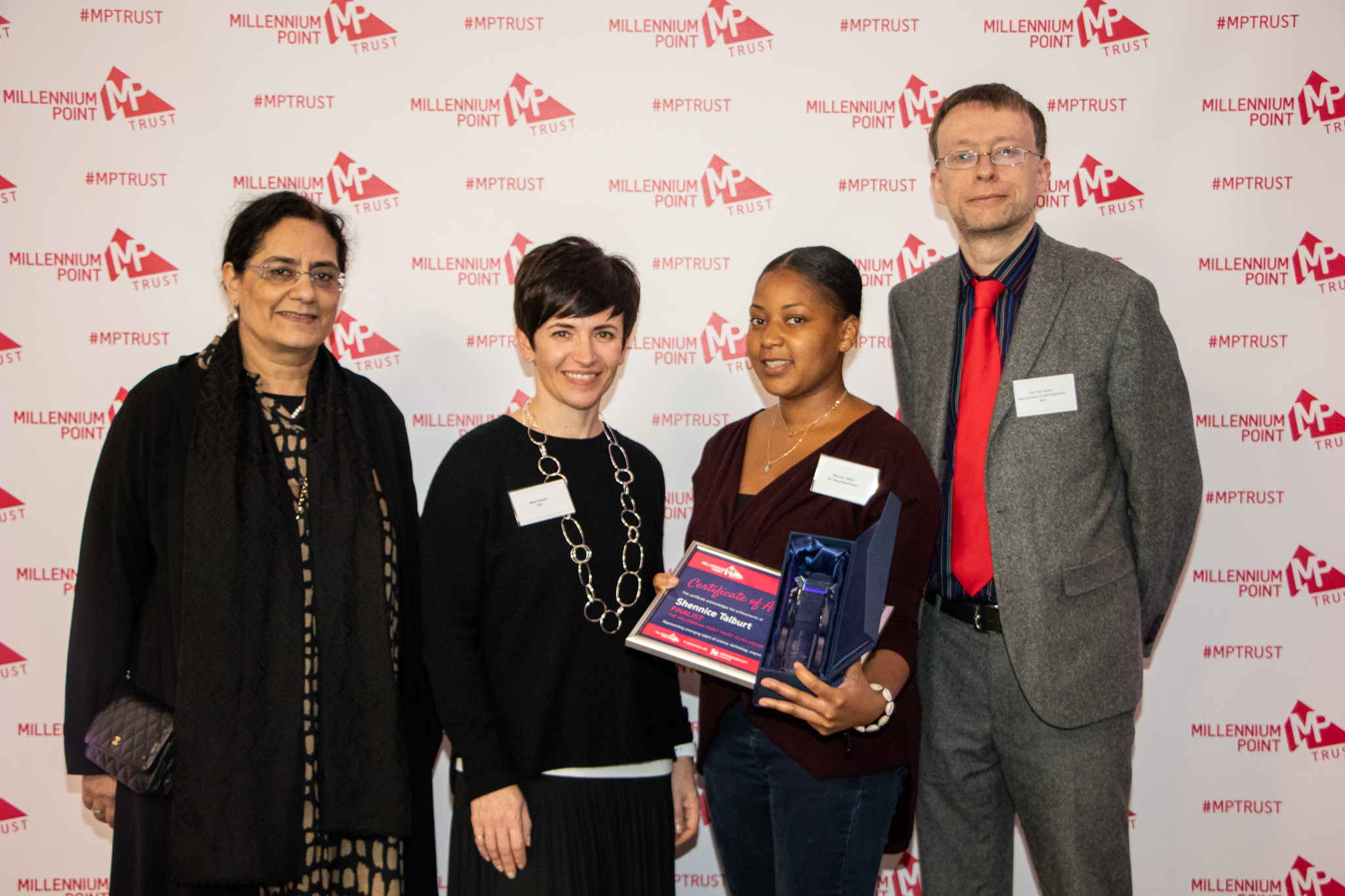
The distinguished judging panel, which will be headed by Millennium Point CEO Abbie Vlahakis, also features:
- Professor Hanifa Shah – Executive Dean of the Faculty of Computing, Engineering and the Built Environment, Birmingham City University
- Kari Lawler – Founder at Youth4Code and Youth4AI
- Mike Ridler – Head of Business Development and Education at Learn by Design
- Sam Gibbs – CEO at IT specialists 81G
The calibre of finalists for this year’s scholarship is impressive as ever, so it’s only right that the quality of our judging panel is equal to it. This is a phenomenal opportunity for all five students – not just the winner of the life-changing scholarship, but the advice and support they all receive from the Trust, both before and after the final.
What’s the Millennium Point Scholarship?
Now in its seventh year, the Millennium Point Trust Scholarship has already funded six inspiring young people from the region through their degrees at Birmingham City University’s Faculty of Computing, Engineering and the Built Environment. Previous winners of the scholarship include Sagal Qodah in 2017, who has since gone on to graduate with a First Class Honours degree in Civil Engineering and has now landed a dream graduate role at Jacobs.
How will a winner be chosen?
The panel will assess our five Scholarship finalists for 2021, who will be announced later this month. The assessment includes a formal presentation and an informal interview about the finalist and their motivation to win the scholarship. While the assessment will take place behind closed doors as a precaution against covid-19, the results will be announced in a closed ceremony which will be broadcast from our multi-award-winning venue on Friday 26th May.
The Livestream will be announced in the coming weeks and will be available to view across our digital channels. For more information on the Scholarship competition, visit www.millenniumpoint.org.uk/scholarship
Image (L – R): Professor Hanifa Shah, Executive Dean of the BCUCEBE, Abigail Vlahakis, CEO of Millennium Point, Shennice Talburt, Scholarship Winner 2020, Prof. Nick Morton, Head of the School of Engineering and the Built Environment at the Scholarship Live Final in 2020.
Find more interesting content from Millennium Point over at our news section, or follow us for daily updates on Facebook, Twitter, Instagram and LinkedIn with @MillenniumPoint. Millennium Point is a landmark public building and multi-award-winning events venue in the Eastside of Birmingham City centre. Profits from our commercial activity are invested by the Millennium Point Charitable Trust into projects, events and initiatives which support the growth of science, technology, engineering and maths (STEM) and education in the West Midlands.
Every year, the Millennium Point Charitable Trust Small Grants programme gives out grants of up to £20,000 to support science, technology, engineering and maths (STEM) education projects in the West Midlands. Applications are now open for 2021.
Here is one of the many projects that the programme has funded in 2020.
Who’s running the project?
The project is run by Bishop Vesey’s Grammar School who is the third oldest school in the West Midlands and one of the leading state schools in the country, offering education to boys in year 7-11, with a co-educational sixth form. The school aims to become an educational hub offering resources to other schools and communities within the area.
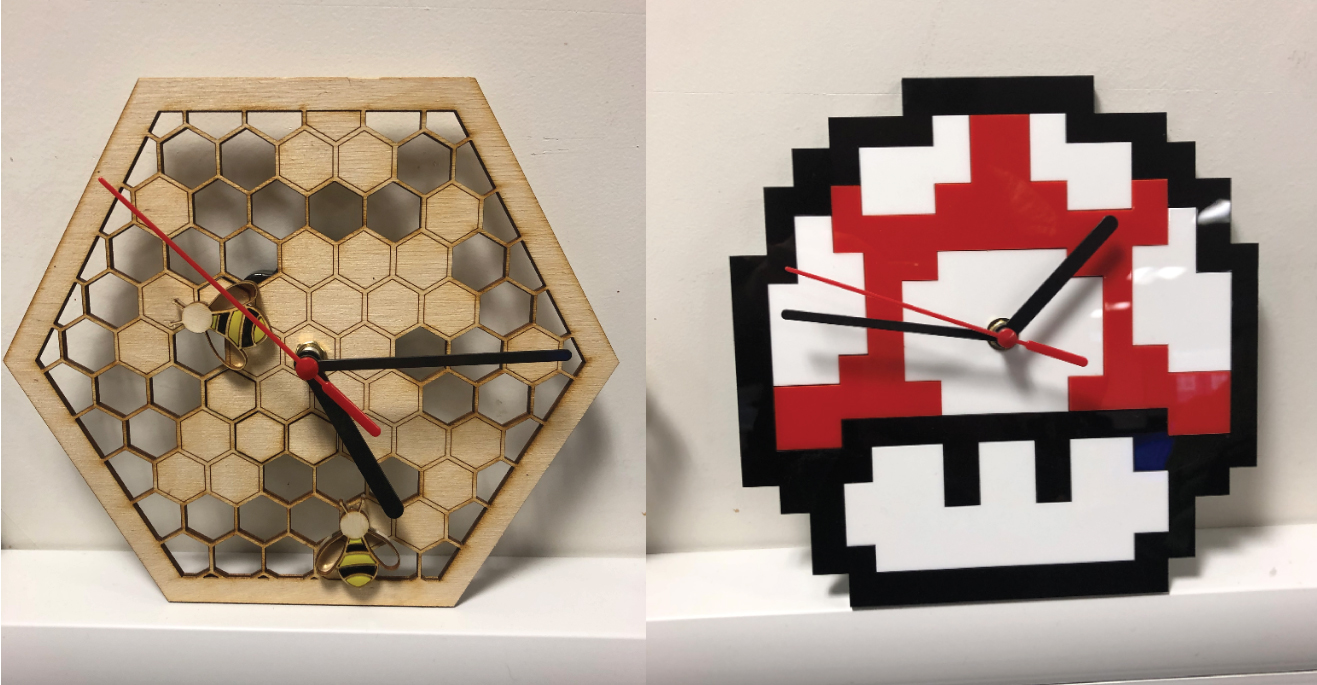
What’s it all about?
The school’s new timekeeping project is aimed at Key Stage Three pupils, specifically those in year 8, with a focus on students designing and making their own working clocks, using the new laser cutter the grant will help buy.
STEM plays a massive part in the school’s culture, including a specialist STEM block that opened in 2017 and science A-Levels the most popular in terms of uptake. This latest project’s aim is to raise skill levels and give students access to areas of DT (Design Technology) they would not normally cover in lesson time. Interest and uptake in the project is expected to be high, so the school has scheduled to run the project twice during the academic year.
The funding will also allow the school to support outreach work with local primaries, which will develop Key Stage Two pupils and give them access to cutting edge technology, inspiring them to consider a future in STEM.
Who will benefit?
As many Year 8 students as possible, depending on the uptake and practicalities of the sessions and bubble timetables. The sessions will be with groups of a maximum of 20 students.
What they said:
Mrs Skye Bowen, Head of Design Technology, commented: “This is an interesting application of the capacity of the laser cutter; it gives the students a physical and working product at the end, and exposes them to CAD and CAM processes. It’s also outside of the realms of projects they might undertake within the confines of the curriculum.
“We have focused on Key Stage Three because due to curriculum restrictions our pupils do not have as much exposure to the practical elements of Design Technology as we would like. Ultimately, it’s our aim to encourage greater numbers of pupils opting for Design Technology as a GCSE subject; we then aim to put on A-level courses in the near future, to support the design and engineering careers.”
About educational grant funding from Millennium Point
Educators, Charities and Not-for-Profits within the West Midlands Combined Authority can apply for up to £20,000 from Millennium Point to fund their STEM activity. For more information on how to access this funding please visit www.millenniumpoint.org.uk/grants
Find more interesting content from Millennium Point over at our news section, or follow us for daily updates on Facebook, Twitter, Instagram and LinkedIn with @MillenniumPoint. Millennium Point is a landmark public building and multi-award-winning events venue in the Eastside of Birmingham City centre. Profits from our commercial activity are invested by the Millennium Point Charitable Trust into projects, events and initiatives which support the growth of science, technology, engineering and maths (STEM) and education in the West Midlands.
We are proud to be working with Wowdot CIC to support the Connect_In campaign, which provides laptops to children without access to computers or the internet.
Our landmark public building in the eastside of Birmingham city centre is a drop off point in which members of the public can donate any unused laptops they have. These laptops will then be refurbished and distributed to vulnerable children within the local area. Millennium Point has further supported the initiative by donating a number of laptops to the cause, alongside encouraging other businesses and the public to support the campaign.
The acceleration of digital demand as a direct result of the coronavirus pandemic has underlined the overwhelming digital poverty that hits schools and children within the West Midlands. Launched by The Child Poverty Action Forum and supported by Wowdot CIC, the Connect_In campaign aims to ensure the most disadvantaged families are receiving the help that they need with homeschooling during the pandemic, in the form of laptops and a stable internet connection. Millennium Point joins a host of businesses that have partnered with Wowdot CIC to support this campaign.
Abbie Vlahakis, CEO of Millennium Point, commented: “Education and STEM are in the trust’s DNA, so it was clear to us that we had to get involved with the Connect_In campaign.
“It’s essential that every child has access to education and digital provision during the pandemic, to give everyone the same life chances and to prevent the “huge gap” between the attainment of disadvantaged pupils and their peers. We’ll not only be serving as a hub for drop-off and collection of laptops, but we’re committed to donating thousands of laptops to disadvantaged local school children too.”

If you or your business has an old laptop you are not using then please bring it to the reception on the ground floor of our landmark public building between 9 am and 5 pm on weekdays.
Alternatively, if you don’t have a laptop but would still like to support then it costs just £300 to provide a family with 12 months of internet connection and a reconditioned PC or laptop. You can donate funds directly to Wowdot’s dedicated account which can be found on their website alongside any other questions you may have.
Our support forms part of our ongoing mission as a STEM charitable trust to enhance the growth of the region’s STEM sectors; this has included funding more than 40 projects in the form of small grants to fund STEM-related projects in the region; working with Birmingham City University’s Faculty of Computing, Engineering and The Built Environment to offer a free undergraduate degree through the Millennium Point Scholarship.
Image 1 caption (left to right): Cas Majid (CEO of WOW Group), Abbie Vlahakis (Millennium Point CEO) and Bevil Williams (Managing Director at Repc Ltd) delivering laptops and equipment to Highfields School in Saltley
Image 2 caption: Entrance to Millennium Point.
Millennium Point is a landmark public building and multi-award-winning events venue in the Eastside of Birmingham City centre. Profits from our commercial activity are invested by the Millennium Point Charitable Trust into projects, events and initiatives which support the growth of science, technology, engineering and maths (STEM) and education in the West Midlands. Find more interesting content from Millennium Point over at our news section, or follow us for daily updates on Facebook, Twitter, Instagram and LinkedIn with @MillenniumPoint.
Every year, the Millennium Point Charitable Trust Small Grants programme gives out grants of up to £20,000 to support science, technology, engineering and maths (STEM) education projects in the West Midlands. Applications are now open for 2021.
Here is one of the many projects that the programme has funded in 2020:
Who’s running the project?
City Road Primary School is situated in the Rotton Park area of north Edgbaston.
What’s it all about?
With support from Millennium Point Charitable Trust, City Road Primary School will create a Sensory Garden for its Early Years pupils. The EYFS (early years foundation stage) outdoor area has been chosen as the dedicated space for this project.
To start the project KS2 children will create designs based on given criteria (outline of the area, needs of children in Early Years, budget and safety aspects). The winning design will be a combination of ideas from children in each KS2 year group. The garden will feature plants (herbs and flowers), solar panel lighting, wind chimes, suncatchers, mirrors and birdhouses. Building raised beds for fruit and vegetables is also included in the project with room for expansion for a solar water feature, a seating area for quiet time and a colourful path linking all the areas depending on budget. The design aspect of this project will build pride in the school and children will hopefully develop a great sense of ownership for the development of the garden.
The sensory garden will provide a great stimulus for developing communication, social skills and an understanding of the world. The design and build of this project will promote STEM throughout the school and community and create a sustainable area which will support teaching and learning for all children as part of the Early Years outdoor learning strand and KS1 and 2’s Science curriculum. This should inspire children’s aspirations and understanding of STEM careers.
Who will benefit?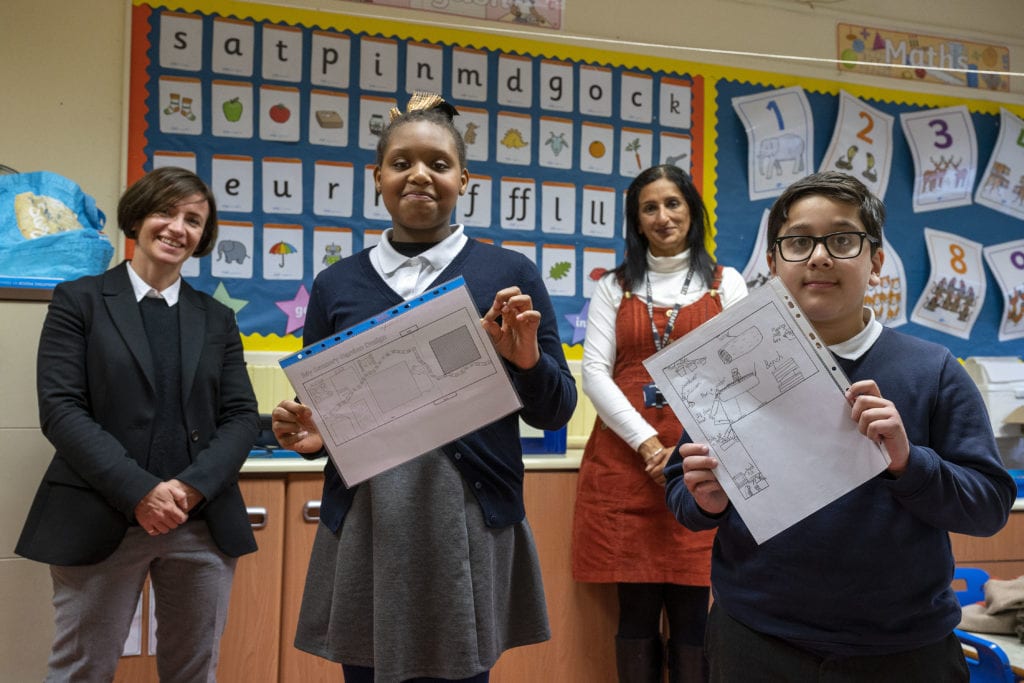
All pupils at City Road Primary will benefit. The Early Years children will have daily use of this exciting learning space to develop communication and social skills, while older children in other year groups will have a sense of responsibility as they will have time to maintain the area in the future. Sessions in the sensory garden will be embedded in the school’s curriculum, thereby ensuring that it will form part of the teaching of STEM subjects in subsequent academic years.
What they said:
Sarvjeet Jandu, Assistant Head Teacher, commented: “We are so excited about this project. A high percentage of our children are from a minority ethnic background within a socially deprived area. In the locality, there is a growing number of families living in overcrowded houses with no outdoor space and as a result, some of these children have little or no experience of growing plants outdoors or of the natural world. This project will expose them to new experiences which they would not otherwise have, understanding sustainability, growing and the importance of outdoor learning through play.
“Many of the KS2 students involved in the design of the garden have younger siblings in reception and nursery and will remember and discuss their time in the same area. The Sensory Garden will emphasise how we are linking learning across the school and promote the excellent work the children have done.”
When’s it all happening?
A grand opening will be planned during the early summer months to unveil the Sensory Garden. Once built, KS2 children will maintain the area and be responsible for its upkeep, as part of their science curriculum.
About educational grant funding from Millennium Point
Educators, Charities and Not-for-Profits within the West Midlands Combined Authority can apply for up to £20,000 from Millennium Point to fund their STEM activity. For more information on how to access this funding please visit www.millenniumpoint.org.uk/grants
Find more interesting content from Millennium Point over at our news section, or follow us for daily updates on Facebook, Twitter, Instagram and LinkedIn with @MillenniumPoint. Millennium Point is a landmark public building and multi-award-winning events venue in the Eastside of Birmingham City centre. Profits from our commercial activity are invested by the Millennium Point Charitable Trust into projects, events and initiatives which support the growth of science, technology, engineering and maths (STEM) and education in the West Midlands.
Millennium Point is dedicated to the growth and enhancement of STEM education in Birmingham and the West Midlands. We achieve this through impactful projects such as our fully funded STEM scholarship and STEM grant funding, events, support initiatives and so much more. With British Science Week upon us, we’re here to celebrate with 3 activities you can do with your family at home to celebrate.
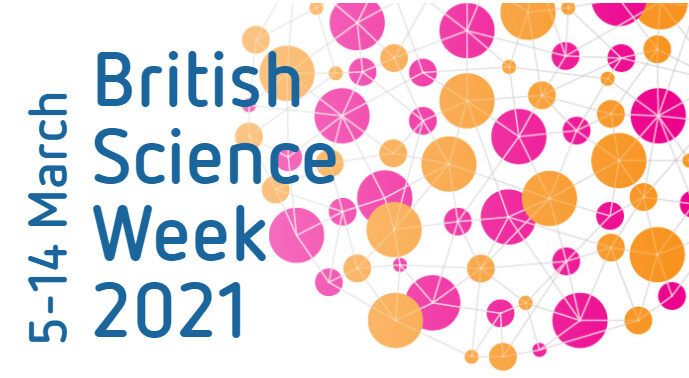
What’s British Science Week?
British Science Week is a ten-day celebration of science, technology, engineering and maths (STEM) that takes place annually around March. This year British Science Week started on 5th March and will continue until this Sunday (14th March) with the theme “Innovating for the Future”. Across the UK schools, parents, teachers and organisations are taking part in a myriad of activities that engage communities in STEM, highlight the importance of STEM in our daily lives and celebrate the achievements and diversity of STEM leaders. You can get involved with activities or events that are already planned via the official website or organise one yourself. The activities in the list below have all been chosen from the free activity packs that are available on their website here.
Crunchy Architecture You Can Eat – (Activity for under 5s)
This activity uses melted chocolate as cement and a variety of different biscuits to get your child to construct buildings or structures which you can all then eat. To start, melt your chocolate in a bowl, either in the microwave or in a bowl on top of a pan of boiling water. Once melted use the chocolate to stick biscuits together to make buildings and structures. When the kids are done with the activity they can then eat their creations. This activity takes about 30 minutes overall. The video below provides a great demonstration of the activity.
(Video Credit: Dennis Fresto)
Kit list
- Different shaped biscuits/and or wafers and crackers
- Dark chocolate
- Bowl, water and saucepan
- Baking paper
- Hob/Microwave
What does this teach?
This activity teaches children about architectural design – chiefly about how materials can be combined, shaped and measured to form structures. It teaches them to think creatively and innovatively with tools at their disposal. What’s more, you can expand this activity to emphasise the STEM elements by getting them to plan out what they want to make, cut biscuits to size and shape and then reflect on whether the finished product changed from the initial design and why.
This activity is an example of sensory learning where children link their learning to memorable activities and experiences – the messier the better! Sensory learning is a crucial part of early years development as it effectively engages children in activities that activate their brain. This allows them to break down difficult topics, like architectural design, into concepts they can comprehend. They will then be able to refer back to what they’ve learned because they can recall the experience of the activity.
Build a working Waterwheel – (Activity for over 5s)
In this activity, you build a working waterwheel. Use a plate to draw and cut out two circles in a thick card or plasticard to make the wheels of your waterwheel. Find the centre of each wheel and cut a smaller hole wide enough to fit a pencil or wooden doweling. Tape or staple the cups to one of the wheels put the second wheel on top to sandwich the cups and secure by pushing the wooden spoke/pencil through the hole in the centre of both. You can now experiment with dropping water from different heights or with greater force to see how it affects the speed of the weel. You determine the speed of the wheel by marking a point on the wheel and counting the number of rotations within 30 seconds.
(Video credit: Two-Point-Four)
Kit List
- Thick card or plasticard
- Pen/Pencil
- Plate (to use as a template)
- Wooden Doweling or a pencil (to spin the wheel)
- Disposable cups (choose recyclable!)
- Scissors
- Adhesive
- Bottled water/hose or equivalent to dropping water
- Bucket / Washing up bowl (or be outside)
What does this teach?
This experiment has a lot to teach about forces and energy in a fun and engaging way. They will learn about how height, gravity and force impact the wheel by dropping water at different heights and with different degrees of force. This is also a great segway into discussing sustainable energy, like the electricity in your house and how these types of mechanism can be used to create sustainable energy. The waterwheel was used historically to power machinery in Victorian mills, using the force of the water cascading down to generate push and pull forces. Now, a similar wheel mechanism is used to generate sustainable electricity with methods like wind and wave power.
Making hot ice – (Activity for over 5s)
In this activity you will create a substance that is liquid at room temperature and but when disturbed will immediately crystallise to form something known as “hot ice”. This is a really fun experiment that doesn’t require a lot to do but has a real “wow” factor when you see the liquid immediately crystalise. To do it, slowly add 3-4 tablespoons of baking powder to 1 litre of clear vinegar and then leave to boil for 30 minutes. When you see a crust starts to form (white stuff known as sodium acetate anhydrous), scoop a bit out and save then take the liquid off the heat and transfer to a container and cover. Transfer to an ice bath or fridge for 15 minutes or until it drops below room temperature. Once cooled take the lid off, add the sodium acetate anhydrous (white stuff you collected earlier) and watch as the liquid crystalises. When you touch it, it will feel hot, not cold – hence hot ice!
(video credit: Home Science)
Kit List
- 1 litre clear (not malt) vinegar
- 4 tbsp baking soda
- Steel saucepan
- Plastic container
- Bucket and ice (if doing an ice bath)
What does this teach?
This activity teaches children about chemical states and reactions. Most substances have a freezing point, where the molecules rearrange from a liquid into a solid or crystal arrangement. Sodium acetate trihydrate, or hot ice, is a supercool liquid, which means even though it’s a liquid at room temperature, the molecules will rearrange into solid form when disturbed (by adding sodium acetate). As the sodium acetate is introduced, the liquid will begin to crystallise and after a few seconds the entire liquid will ‘freeze’. However, if you touch it, the substance will feel hot, not cold, because the process of crystallisation is exothermic. That means that heat is given off, so the liquid turns into a solid.
That’s it for our 3 STEM Activities to Celebrate British Science Week. The activities in the list below have all been chosen from the free activity packs that are available on their website here. We hope you enjoy British Science Week and don’t forget to share your results with us on social media by tagging @millenniumpoint!
Find more interesting content from Millennium Point over at our news section, or follow us for daily updates on Facebook, Twitter, Instagram and LinkedIn with @MillenniumPoint. Millennium Point is a landmark public building and multi-award-winning events venue in the Eastside of Birmingham City centre. Profits from our commercial activity are invested by the Millennium Point Charitable Trust into projects, events and initiatives which support the growth of science, technology, engineering and maths (STEM) and education in the West Midlands.
Every year, the Millennium Point Charitable Trust gives out grants of up to £20,000 to support science, technology, engineering and maths (STEM) education projects in the West Midlands. Applications are now open for 2021. Meadows Primary School and Resource Base received a grant in 2020 to transform dilapidated school grounds into an engaging outdoor science area. This is their story.
Who’s running the project?
The Meadows Primary School and Resource Base is a three-form entry primary school in Northfield, Birmingham. The children are aged between four and 11 years with 45% of the pupils being disadvantaged children who receive free school meals and grow up in challenging circumstances. Additionally, 24% of children have Special Educational Needs (SEN) requiring specialist supported learning.
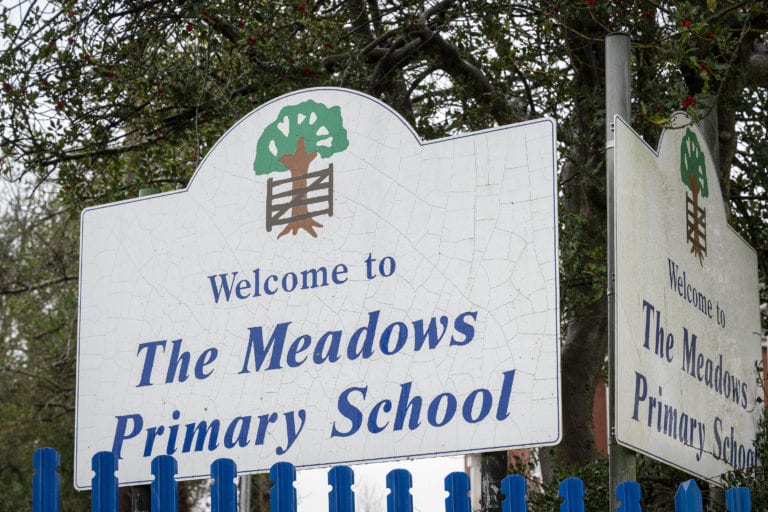
What’s it all about?
The existing woodland area around the school has become run down and unusable due to limited school funding. Apart from a small playground, there are no outdoor areas, such as playing fields, other than this dilapidated area. The grant from Millennium Point Charitable Trust will fund the development of a pond and wildlife area within the school grounds. The objective is to enable the children to immerse themselves in the local environment while learning about biological and life sciences outside of the traditional classroom environment. This will prove especially important for those children with learning difficulties, enabling the school to provide more dynamic lessons using the external spaces to better suit their learning needs. The funds will also help pay for den building kits, wellington boots and all-in-ones for the children – an outlay that many families simply can’t afford.
Who will benefit?
This project will benefit the whole school, including the children in the resource base (which is integrated within the mainstream school), who have speech and language disorders. They sometimes have additional needs such as dyslexia, autism, ADHD, physical difficulties, sensory impairments or social and emotional development.
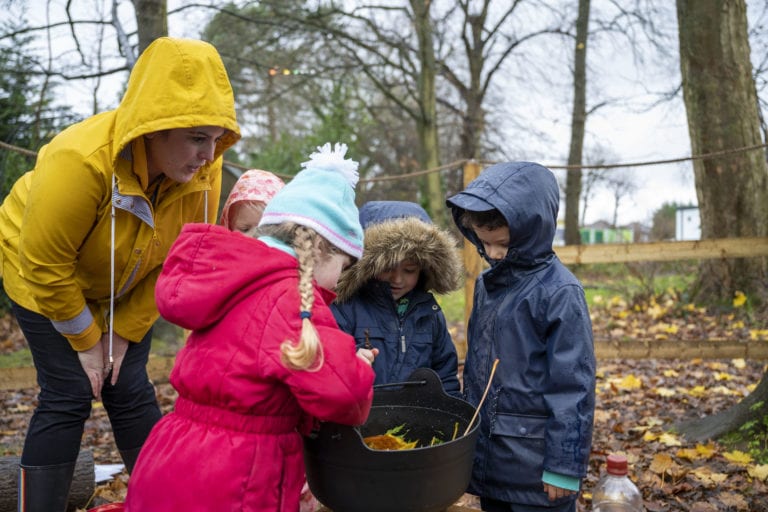
What they said:
Alex Morris, the school’s science coordinator: “Science is a major part of what we do in every single curriculum and year group, and this project will have a huge impact on the children in our care. Due to the parents’ financial constraints, the children have very limited experiences of habitats beyond their own street. They don’t experience what a lot of children do, like walks in the countryside.
“The grant will enable the children to develop their vocabulary of plants and animals beyond the classroom walls. Developing this project would benefit every year group and vastly impact the children’s progress and attainment.
“Due to home circumstances, many children within the school have mental health problems, so they need a great deal of emotional support, and providing an area for calm reflection when they feel overwhelmed would vastly benefit the children in our care.
“We also hope this project will inspire and encourage the traditionally marginalised groups, such as the children in our resource base, to pursue STEM careers in the future; opening up a range of possibilities and develop the children’s confidence to pursue these careers in the future.”
When’s it all happening?
It is hoped that the wildlife area will be ready in Spring 2021; the pool will be created by the Summer, pandemic restrictions pending.
Can grant funding unlock your STEM project?
There’s still time to apply for funding from the Millennium Point Charitable trust this year. Applications must be submitted by 5 pm on 30th November 2020. To apply for the Millennium Point Charitable Trust Small Grants programme 2021, visit: www.millenniumpoint.org.uk/grants/apply
Find more interesting content from Millennium Point over at our news section, or follow us for daily updates on Facebook, Twitter, Instagram and LinkedIn with @MillenniumPoint. Millennium Point is a landmark public building and multi-award-winning events venue in the Eastside of Birmingham City centre. Profits from our commercial activity are invested by the Millennium Point Charitable Trust into projects, events and initiatives which support the growth of science, technology, engineering and maths (STEM) and education in the West Midlands.
The deadline to apply for our life-changing scholarship at Birmingham City University ends on Sunday.
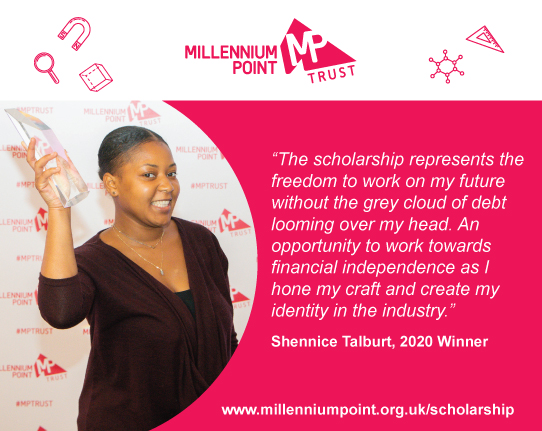
We’ve partnered with Birmingham City University’s Faculty of Computing, Engineering and the Built Environment, to fully fund tuition fees in one of 20 different courses across computing, digital technology, engineering and the built environment. Now in its seventh year, the Millennium Point Trust Scholarship has already funded six young people from the region through their degrees at Birmingham City University – which originally started as the Young Innovator Prize in 2015.
How do you apply?
The competition is open to applicants aged 17 and over within the West Midlands Combined Authority, who are looking to start a qualifying degree in September 2021.
To apply, they need to download and complete this quick and easy application form from our website by answering four questions.
They will then submit their completed form to [email protected] by Sunday 28th February 2021. We will invite five applicants to a final assessment day in April 2021 before deciding a winner.
Who can apply?
Applications are only being accepted from students living in the West Midlands Combined Authority, who cannot already have or currently be studying an undergraduate degree. The scholarship only applies to a qualifying course at Birmingham City University. For further information, check out the rules section.

Why should you apply?
All finalists will benefit from the programme with opportunities that can kick start their career in science, technology, engineering or maths (STEM). One person will get a fully funded degree – which means they won’t pay their undergraduate tuition fees which are upward f £27,000.
All finalists receive skills development and training to build their confidence before the live final. Following the competition, they can become an alumnus of the programme and benefit from a range of opportunities such as mentoring, work placements and networking.
Why do we do this?
Birmingham and the West Midlands is teeming with unfettered STEM talent. Now, more than ever, young people need our support and encouragement for them to unlock their potential. The scholarship is one of several ways we, as a charitable trust, support the growth of STEM industries in the region and do our bit to secure the future and economic growth of an area and a community that has been designated the largest hub for science and innovation outside of London. For more information on how you can get involved please visit this page.
Get started
If you or someone you know is interested, head over to millenniumpoint.org.uk/scholarship and start the application. Deadline for applications is Sunday 28th February 2021.
Millennium Point is a landmark public building and multi-award-winning events venue in the Eastside of Birmingham City centre. Profits from our commercial activity are invested by the Millennium Point Charitable Trust into projects, events and initiatives which support the growth of science, technology, engineering and maths (STEM) and education in the West Midlands. Find more interesting content from Millennium Point over at our news section, or follow us for daily updates on Facebook, Twitter, Instagram and LinkedIn with @MillenniumPoint.
